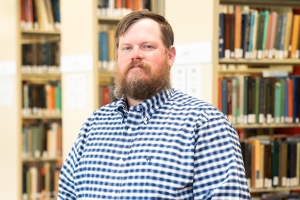
Melissa Kerin Quoted in ProPublica Article The professor of art history and director of the Mudd Center for Ethics offered her opinion on the nuances of the return of a Buddha sculpture by the Art Institute of Chicago to the Government of Nepal.
Melissa Kerin, professor of art history and director of the Roger Mudd Center for Ethics at Washington and Lee University, was recently quoted in an article published in ProPublica, an independent, nonprofit newsroom that produces investigative journalism on abuses of power.
An expert in the area of South Asian and Tibetan art and architecture, Kerin was quoted in a story titled “The Art Institute of Chicago Returned a Sculpture to Nepal But Obscured Its Connection to a Wealthy Donor.”
The article examines a recent announcement by the Art Institute of Chicago (AIC) about the return of a 12th-century Nepalese sculpture called “Buddha Sheltered by the Serpent King Muchalinda” to the Government of Nepal. While the Art Institute’s press release notes that the sculpture had been stolen from the Guita Bahi monastery in the Kathmandu Valley, it omits details of how or when the AIC acquired the significant sculpture.
“All that is mentioned in the press release about the object’s display at the AIC is ‘Since 1997, this object has been on regular view in the museum galleries and featured in landmark exhibitions,’” said Kerin. “That’s painfully little information for any historian trying to understand practices of illicit trade in antiquities.”
As ProPublica journalist Steve Mills demonstrates in his article, the object was donated to the AIC about 30 years ago by the now deceased Chicago philanthropists James and Marilynn Alsdorf. Both James and Marilynn served among the Art Institute’s leadership, donating several collections and more than $20 million to the Art Institute over their lives.
Mills’ article references that more than a dozen art pieces in the Alsdorf’s collection are claimed by other countries, including Nepal and Thailand. However, evidence does not exist to explain how the Alsdorfs acquired them.
The ProPublica piece references that Kerin believes the Art Institute is at once trying to earn public favor by stating that its “provenance research” is an institutional priority and that its “provenance research team” is one of the largest in the country. Kerin said recently, “Yet this same team has, in the end, worked to conceal the Alsdorf name and to obscure information about the illicit practices engaged to steal this object from Nepal. The AIC wants it both ways: to get credit for returning the object for which there was unquestionable evidence of its theft and to protect the very people who engage in illicit practices from which the museum benefits by way of donations and gifts.”
Mills quotes Kerin in his article, where she says, “It looks proactive. They’re getting rid of a problematic object, but people will never know the full details of it. They are face-saving the Alsdorfs and their relationship with them and with all donors. They have a lot to lose.”
The article further notes that the AIC devotes a page online to works that have been removed from its collection, a process called deaccessioning. However, unlike other pages on the AIC website about pieces on display, their pages for deaccessioned items don’t include ownership information, further protecting itself from its association with the Alsdorf’s controversial donated collections.
Kerin has been a member of the W&L faculty since 2011. She served as head of the Middle East and South Asia Studies program from 2020-2023, and she began a three-year appointment as director of the Mudd Center in July 2024. She received a Bachelor of Arts in women’s studies from Trinity College (Connecticut) and earned a Master of Theological Studies from Harvard Divinity School. She also earned a Ph.D. in the history of art from the University of Pennsylvania.
If you know a W&L faculty member who has done great, accolade-worthy things, tell us about them! Nominate them for an accolade.
 Melissa Kerin, professor of art history and director of the Roger Mudd Center for Ethics
Melissa Kerin, professor of art history and director of the Roger Mudd Center for Ethics
You must be logged in to post a comment.